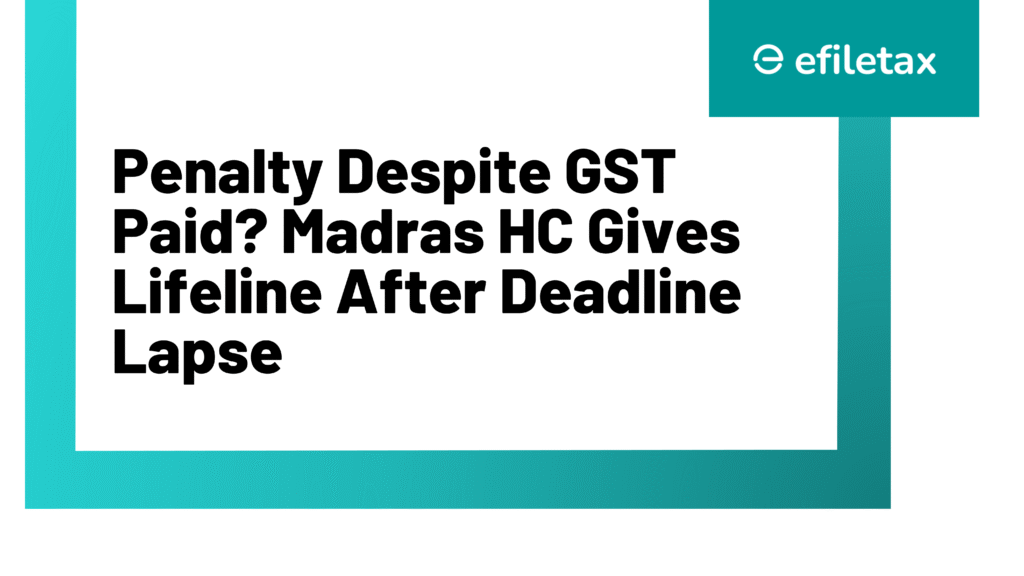
Can Penalty Be Imposed When GST Is Paid? Madras HC Says Yes — But Offers Relief
In a recent case, the Madras High Court ruled that penalty under GST can still be imposed even if the tax has already been paid. However, the Court also showed leniency by allowing the petitioner 15 more days to file an appeal—despite the fact that the limitation period had already lapsed.
This blog breaks down the legal reasoning, timelines, and what Indian taxpayers should learn from this decision.
Background of the Case
- Petitioner’s claim: GST dues were fully paid. So, penalty proceedings should not continue.
- Department’s action: Issued an order under Section 74(9) of the CGST Act, demanding both interest and penalty.
- Petitioner’s request: Quashed the penalty order on the ground that tax payment was already made.
- High Court’s response: Dismissed the plea but granted 15 more days to file an appeal under Section 107.
Legal Provisions Involved
| Provision | Relevance |
|---|---|
| Section 74(9) | Final adjudication order for tax short payment due to fraud/suppression. |
| Section 107 | Allows appeal within 3 months (90 days) from the date of communication of order. |
| Section 75(9) | Tax and interest must be paid before penalty is imposed. |
Key Takeaways from the Madras HC Judgment
- Paying GST dues doesn’t exempt you from penalty, especially under Section 74 (fraud or suppression involved).
- Appeal limitation is strict—but the Court can relax it in exceptional cases, as seen here.
- Litigants must proactively file appeals; relying on court intervention for delay condonation is risky.
- Court rejected the argument that tax payment nullifies penalty proceedings.
Expert View: What This Means for Taxpayers
According to GST practitioners, this ruling reinforces a key compliance point:
“Just paying GST late won’t absolve you from penalty if there’s evidence of suppression or intent to evade. Always file replies to SCNs and avoid silence—it’ll count against you.”
Practical Tips to Avoid Penalty Under GST
- Reply to Show Cause Notices (SCNs) within 7–15 days.
- Use Form DRC-03 to make voluntary payments early—this can reduce penalty liability.
- Maintain documentation to prove there’s no intent to evade tax.
- File appeal under Section 107 within 90 days of receiving the order.
- Track orders on the GST portal regularly—limitation starts from date of communication, not your actual viewing.
Why the High Court Gave 15 Extra Days
Even though the limitation had passed, the HC considered:
- Petitioner had fully paid the GST.
- The department had not suffered loss in tax collection.
- Fair opportunity of hearing was a principle worth upholding.
But this was not a blanket relaxation—the appeal must be filed within 15 days as per the Court’s final order.
Related Efiletax Blog
👉 How to Reply to GST Show Cause Notice
FAQs
Q1. Can GST penalty be imposed if tax is paid?
Yes, if the tax was paid after suppression or fraud, penalty under Section 74 can still apply.
Q2. Can High Court extend limitation period for GST appeal?
Not usually. But in rare cases, like this, the Court may grant a short grace period for filing the appeal.
Q3. What’s the time limit to appeal a GST order?
90 days from the communication of the order.
Summary
Penalty under GST can still apply even if dues are paid, says Madras HC. Court dismissed petition but gave 15 more days to file appeal despite lapse of limitation.
Final Words
This case is a clear signal to taxpayers—compliance doesn’t end with payment. Timely replies, appeals, and documentation matter more than ever in GST litigation.